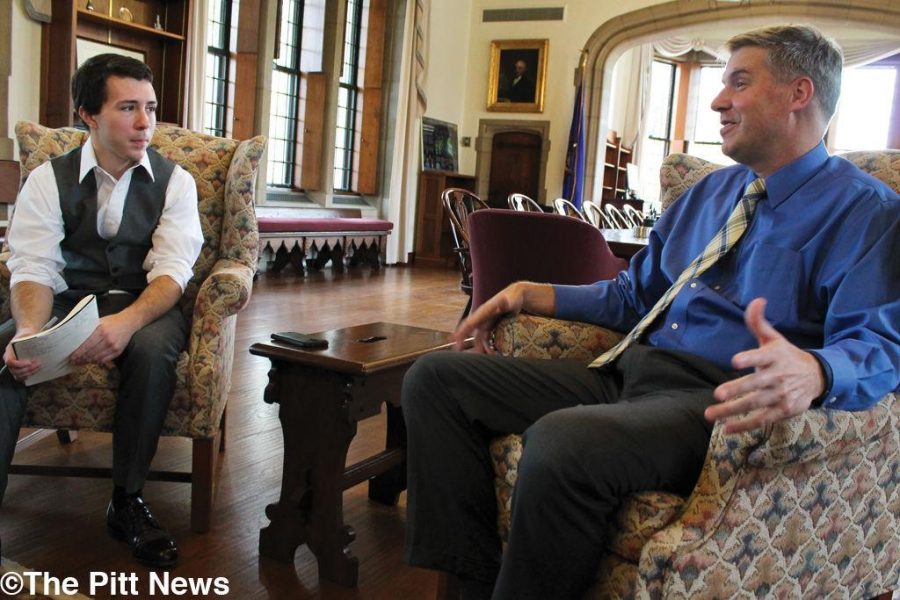Talk with the top: Gallagher’s first three months
October 23, 2014
When Patrick Gallagher received the offer to become Pitt’s new Chancellor, he almost said no.
“My knee-jerk reaction was ‘No, thank you,’” he said. “But I remember hanging up the phone thinking ‘This is one of those calls I can’t say ‘no’ to right away.’”
Gallagher left his role as director of the National Institute of Standards and Technology (NIST), a government agency. Gallagher earned his Ph.D. in physics from Pitt in 1991 and was eager to return, he said.
Almost three months into his chancellorship, he is easing himself into his new role. So far, he said, he has spent most of his time listening to the students, faculty and leaders on campus.
“I felt I had to find out what was happening, what were the exciting ideas, what were people concerned about, so I’ve spent almost all of my time in that listening mode,” he said.
Gallagher said he sees Pitt doing big things in the near future, but wanted Pitt to show him where it wanted to go.
“I really didn’t want to come with some secret plan in my hip pocket … that’s not fair. I’ve got a lot to learn,” he said.
One of his goals as chancellor, Gallagher said, is increasing student value. He wants to ease the financial burden on students and families, he said.
“My feeling is, rather than ducking it and hoping it goes away, we should go all in,” Gallagher said. “I’m prepared to step in with my counterparts and other university presidents around the country to make sure our voices are heard. I think we can make some progress on this in the next five years.”
Over the last three years, Pitt has suffered severe cuts in state funding.
This year, however, Pitt has requested a 15 percent increase in funding, Gallagher said. He has also started to look at how Pitt can better manage its finances.
“We’ve already started to look at cost,” he said. “Does the University manage cost well?”
Gallagher said he wants to see Pitt schools, including the medical and engineering schools, able to solve “some of the biggest problems for society.” An increase in funding is one way to achieve this, he said. Collaborating with other institutions will also help Pitt succeed.
“We can work with the city, the county, we can collaborate with CMU that all have that common north star that we’re focused on,” he said.
Gallagher said he plans to apply this same style of leadership to his new role at Pitt. Coming back to Pitt, he said, was important to him and seemed like a natural ending to his time at the NIST.
“What’s more important than supporting … the future of our country by providing a great education to students and disseminating our research to the world?” he asked.
As he started the process of transferring from the NIST, which rewarded a $15 million grant to Pitt in 2010 under Gallagher’s leadership, he grew more comfortable.
“I ended up with the feeling that the University was a good fit for me. That was a great feeling. This feels right. I feel like I can contribute and play a role,” he said.
Gallagher’s surrounding faculty and administration have received him warmly so far, he said.
Michael Spring, president of the University Senate and associate professor of information science and telecommunications, said Gallagher is a good man and will make a good leader.
“I have every reason to believe that, 15 years from now, we will be saying that Pitt [had] had three extraordinary chancellors — something very fortunate for our institution,” he said.
Spring also said he sees Gallagher as a worthy successor to Mark Nordenberg, who served as Chancellor for 17 years and officially stepped down in August.
“Chancellor Gallagher has made [it] clear that he believes we can be yet greater, more global in scope, better in education, an increasingly important partner in the region,” Spring said.
Richard Colwell, president of the Staff Association Council, said he sees Chancellor Gallagher taking the University far.
“Every interaction with Chancellor Gallagher, to date, only strengthens my belief that … the University of Pittsburgh [will] grow way beyond our expectations in the near future,” he said.
He also likes how accessible the new chancellor seems to be.
“When meeting with Gallagher, he talks openly and honestly,” he said. “It is not unusual to run into him on campus and strike up a conversation.”
Other staff, including University spokesman Ken Service, are encouraged.
“In the short time that I have been working with Chancellor Gallagher, I find him to be committed to continuing the positive momentum of the University,” Service said. “He also clearly views giving the students the best possible learning opportunities to be one of his highest priorities.”
Pitt’s future is bright, according to Gallagher.
“I share this very strongly: Our best days are still ahead of us,” he said. “The real measure of success is in the success of our graduates. What I will be most proud of is the students who came through the University while I was here.”
Editors note:
In an previous version published on Oct. 24, The Pitt News reported that NIST, the National Institute of Standards and Technology, oversees the Census Bureau, National Weather Service and Patent and Trademark office. This is incorrect. NIST does not have oversight over these agencies but is a part of the U.S. Commerce Department with the other agencies. The Pitt News also reported that NIST donated $15 million to Pitt in 2010. This is incorrect. The American Recovery and Reinvestment Act granted Pitt money to support scientific research facilities in 2010. The Pitt News regrets these errors.



